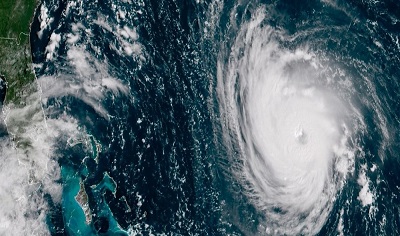Hurricane Florence: Police, Fire, Emergency Medical Service from Northern Cities Ready for Immense Hurricane in South
“My people just informed me that this [Hurricane Florence] is one of the worst storms to hit the East Coast in many years. Also, looking like a direct hit on North Carolina, South Carolina and Virginia. Please be prepared, be careful and be SAFE!” – President Donald Trump, Sept. 12, 2018.

As Hurricane Florence begins to rear its deadly and destructive head into a number of Atlantic Coast cities, towns, and rural areas, the American people are being warned by talk show hosts, alternative news sources (NewsMaxTV, One America News Network) and Internet bloggers to heed their warnings and storm coverage, according to Capt. William Allison, of a New Jersey police department.
“Don’t be fooled into watching CNN, MSNBC, ABC, NBC, ABC or other news outlets except if they are your only source of info. Before the hurricane struck the U.S. coast, they were already providing the nation with anti-Trump news stories without anything even remotely resembling news reporting,” said Capt. Allison in an interview with Conservative Base’s editor, Jim Kouri.
“I’ve heard reporters and anchor people bashing Trump and ignoring all the preparations. For instance, the highly-praised Andrea Mitchell was more concerned with her story that Trump transferred less than $10,000.00 from the Federal Emergency Management Administration (FEMA) to the Homeland Security Department to help in illegal immigrant captures and deportation,” Allison said.
“$10,000.00 transfer to Homeland Security? That’s so important? Hell, Hillary Clinton, her husband and their ‘mob’ stole more than that during their response to a natural disaster in Haiti,” noted Michael Baker, political strategist and former prosecuting attorney.
Without the usual fanfare and boasting one usually sees when Democrats are in power, the United States’ military and civilian personnel geared up and headed out — or are ready to head out — to several locations in the Southern states such as North Carolina, South Carolina, Virginia and other parts of the U.S. to offer their expertise in fire, search, crowd control, and emergency medicine.
This caravan of first-responders includes members of the New York City Fire Department (New York’s Bravest) and the New York City Police Department (New York’s Finest), as well as paramedics and ambulance technicians.
“New York’s first-responders take a backseat to no one when it comes to disaster response,” said former NYPD officer Orlando Ruiz, who served in the department’s Emergency Services Unit (ESU), the unit that handles SWAT team responses, underwater search, hostage and barricade cases, and other man-made and natural emergencies.
“I’m told there are cops, firemen and paramedics throughout the country who are paying their own expenses to travel to locations where U.S. transport planes await volunteers,” said Ruiz.
Meanwhile, U.S. national security, public health, police and fire personnel are reviewing their own emergency plans should there be a one-two punch — hurricane/flood conditions.
In the United States, the Department of Homeland Security (DHS) is the primary federal entity responsible for ensuring that first-responders, such as police, fire, emergency medical and public health personnel, have the capabilities needed to provide a coordinated, comprehensive response to any large-scale crisis.
In the past as part of President Trump’s rebuilding U.S. defenses, the DHS has awarded $11.3 billion to state and local governments to enhance capabilities, primarily to prevent, prepare for, respond to and recover from acts of terrorism or natural disasters. Presidential directives have instructed the DHS to develop a national all-hazards approach — preparing all sectors of society for any emergency event including terrorist attacks and natural or man-made disasters.
 The US Congress’ General Accounting Office reviewed these policy initiatives and determined that each supports a national, all-hazards approach, not just a terrorism response approach. The GAO officials have studied many of the deficiencies within the U.S. and they have delivered their reports to the leaders of several House and Senate committees.
The US Congress’ General Accounting Office reviewed these policy initiatives and determined that each supports a national, all-hazards approach, not just a terrorism response approach. The GAO officials have studied many of the deficiencies within the U.S. and they have delivered their reports to the leaders of several House and Senate committees.
DHS has undertaken three major policy initiatives aimed at creating a national, all-hazards coordinated and comprehensive response to large-scale incidents:
(1) a national response plan (what needs to be done);
(2) a command and management process (how it needs to be done); and
(3) a national preparedness goal (how well it should be done).
DHS has also developed plans to implement three related programs to enhance first-responder capabilities:
(1) to assess and report on the status of first-responders’ capabilities;
(2) to prioritize national resources; and
(3) to establish a national training and exercise program.
 Implementing these programs will likely pose a number of challenges for DHS including integrating internal and external assessment approaches, assessing state and local risks in a national context to effectively prioritize investments, and establishing common training requirements for each first-responder discipline.
Implementing these programs will likely pose a number of challenges for DHS including integrating internal and external assessment approaches, assessing state and local risks in a national context to effectively prioritize investments, and establishing common training requirements for each first-responder discipline.
Because terrorist attacks share some common characteristics with natural and accidental disasters, 30 of DHS’ 36 capabilities, first-responders’ need to support preparedness and response efforts.
GAO’s analysis found that the baseline capabilities required for terrorist attacks and natural or accidental disasters are more similar for response and recovery and differ most for prevention.
Since terrorist attacks are planned, intentional acts, all of DHS’ prevention capabilities focus on terrorist attacks, while almost all other baseline capabilities focus on all hazards.
Legislation and presidential directives call for DHS to place special emphasis on preparedness for terrorism and DHS has directed that the majority of first-responder grant funding be used to enhance first responder capabilities to prevent, protect against, respond to, and recover from terrorist attacks. Nonetheless, grant funds can have all-hazards applications.




Pingback: Hurricane Florence: Police, Fire, Emergency Medical Service from Northern Cities Ready for Immense Earthquake in South – USSA News | The Tea Party's Front Page
Pingback: Hurricane Florence: Police, Fire, Emergency Medical Service from Northern Cities Ready for Immense Hurricane in South – USSA News | The Tea Party's Front Page